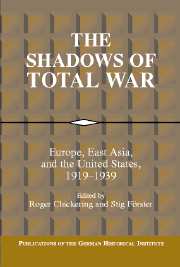Book contents
- Frontmatter
- Introduction
- Part One Reflections on the Interwar Period
- Part Two Legacies of the Great War
- Part Three Visions of the Next War
- 8 Sore Loser: Ludendorff’s Total War
- 9 Strangelove, or How Ernst Jünger Learned to Love Total War
- 10 Shadows of Total War in French and British Military Journals, 1918-1939
- 11 Yesterday’s Battles and Future War: The German Official Military History, 1918-1939
- 12 “The Study of the Distant Past Is Futile”: American Reflections on New Military Frontiers
- Part Four Projections and Practice
- Index
9 - Strangelove, or How Ernst Jünger Learned to Love Total War
Published online by Cambridge University Press: 05 January 2013
- Frontmatter
- Introduction
- Part One Reflections on the Interwar Period
- Part Two Legacies of the Great War
- Part Three Visions of the Next War
- 8 Sore Loser: Ludendorff’s Total War
- 9 Strangelove, or How Ernst Jünger Learned to Love Total War
- 10 Shadows of Total War in French and British Military Journals, 1918-1939
- 11 Yesterday’s Battles and Future War: The German Official Military History, 1918-1939
- 12 “The Study of the Distant Past Is Futile”: American Reflections on New Military Frontiers
- Part Four Projections and Practice
- Index
Summary
In World War I, the scale and intensity of destruction gave rise to the term total war. Quantity alone did not, however, make World War I the great “seminal catastrophe” of the twentieth century; this great conflict also frustrated intentions, defied attempts to control it, and turned every participant into its sorcerer’s apprentice. Individual heroism could not contend with the machine-gun. Military ingenuity could find no productive alternative to the resource-draining stalemate on the western front; and proud idealism counted less in the war’s outcome than did technology and production levels.
Under these circumstances the enthusiasm of August 1914 quickly evaporated. The German volunteers of August 1914 experienced a shock. These largely middle-class men had believed that the war would stimulate idealism and unity; instead, they soon experienced unjust treatment from their officers, tensions with soldiers of humbler social backgrounds, war-profiteers, and loud-mouthed beer-hall patriots with simplistic slogans. They searched for adventure and heroism, but instead they found that modern warfare demanded endurance, discipline, and the precise execution of limited tasks within a huge machinery of destruction. Their contacts with home soon taught them that their sacrifice could not protect their loved ones from hardship. Thus for many soldiers, the “ideas of 1914” soon rang false; and defeat after four years of propaganda made it even more difficult for them to find meaning in the slaughter.
- Type
- Chapter
- Information
- The Shadows of Total WarEurope, East Asia, and the United States, 1919–1939, pp. 179 - 196Publisher: Cambridge University PressPrint publication year: 2003

